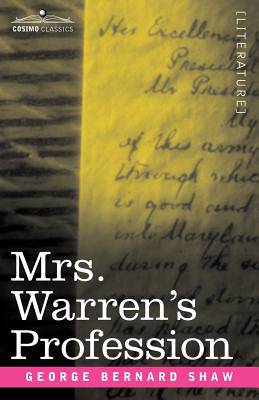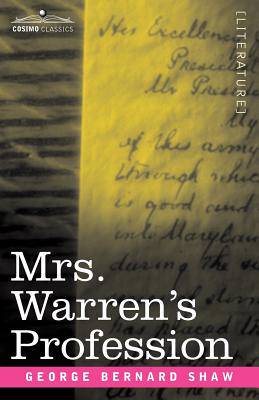
Bedankt voor het vertrouwen het afgelopen jaar! Om jou te bedanken bieden we GRATIS verzending (in België) aan op alles gedurende de hele maand januari.
- Afhalen na 1 uur in een winkel met voorraad
- In januari gratis thuislevering in België
- Ruim aanbod met 7 miljoen producten
Bedankt voor het vertrouwen het afgelopen jaar! Om jou te bedanken bieden we GRATIS verzending (in België) aan op alles gedurende de hele maand januari.
- Afhalen na 1 uur in een winkel met voorraad
- In januari gratis thuislevering in België
- Ruim aanbod met 7 miljoen producten
Zoeken
Omschrijving
Middle-aged Mrs. Warren is a madam, proprietress of a string of successful brothels. Her daughter, Vivie, is a modern young woman, but not so modern that she's not shocked to discover the source of her mother's wealth. The clash of these two strong-willed but culturally constrained Victorian women is the spark that ignites the ironic wit of one of George Bernard Shaw's greatest plays, a withering critique of male domination, sexual hypocrisy, and societal convention. Initially banned after its 1893 publication with its startling frankness, Mrs. Warren's Profession remains a powerful work of progressive theater. Irish playwright GEORGE BERNARD SHAW (1856-1950) won the Nobel Prize in Literature in 1925 and an Academy Award for Adapted Screenplay in 1938, the only person to achieve both honors. Among his many renowned plays are Arms and the Man (1894), Candida (1894), Man and Superman (1903), Major Barbara (1905), and Pygmalion (1913).
Specificaties
Betrokkenen
- Auteur(s):
- Uitgeverij:
Inhoud
- Aantal bladzijden:
- 60
- Taal:
- Engels
Eigenschappen
- Productcode (EAN):
- 9781596059801
- Verschijningsdatum:
- 1/10/2006
- Uitvoering:
- Paperback
- Formaat:
- Trade paperback (VS)
- Afmetingen:
- 140 mm x 216 mm
- Gewicht:
- 86 g

Alleen bij Standaard Boekhandel
+ 16 punten op je klantenkaart van Standaard Boekhandel
Beoordelingen
We publiceren alleen reviews die voldoen aan de voorwaarden voor reviews. Bekijk onze voorwaarden voor reviews.









